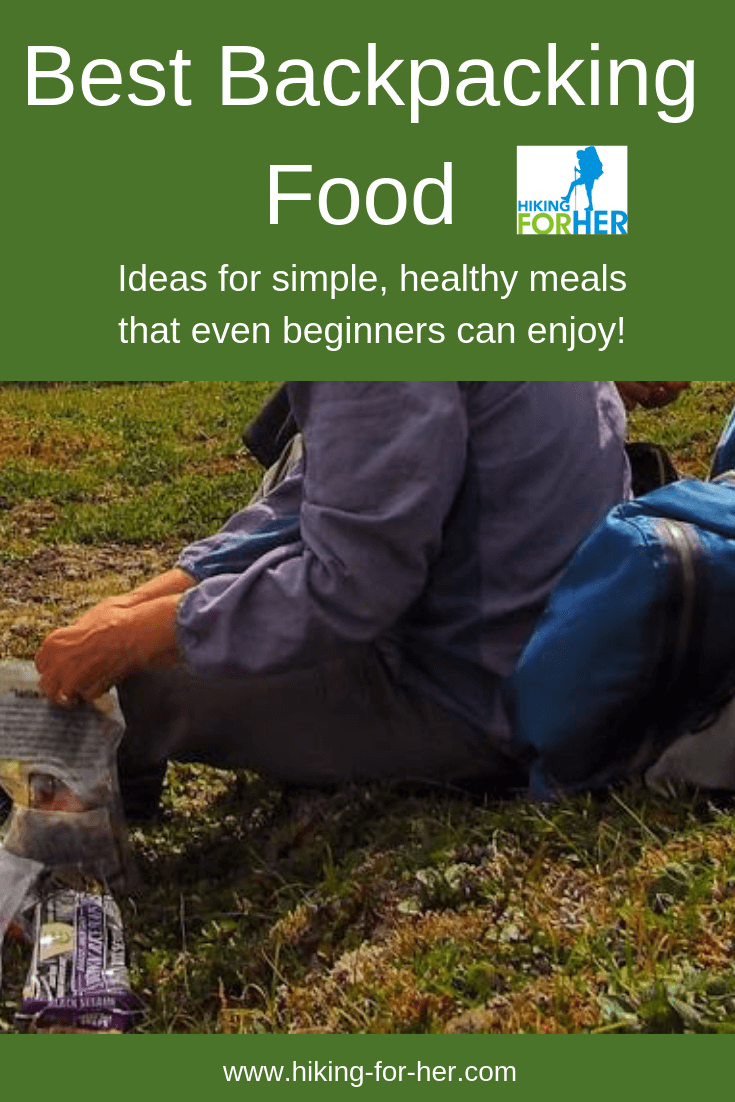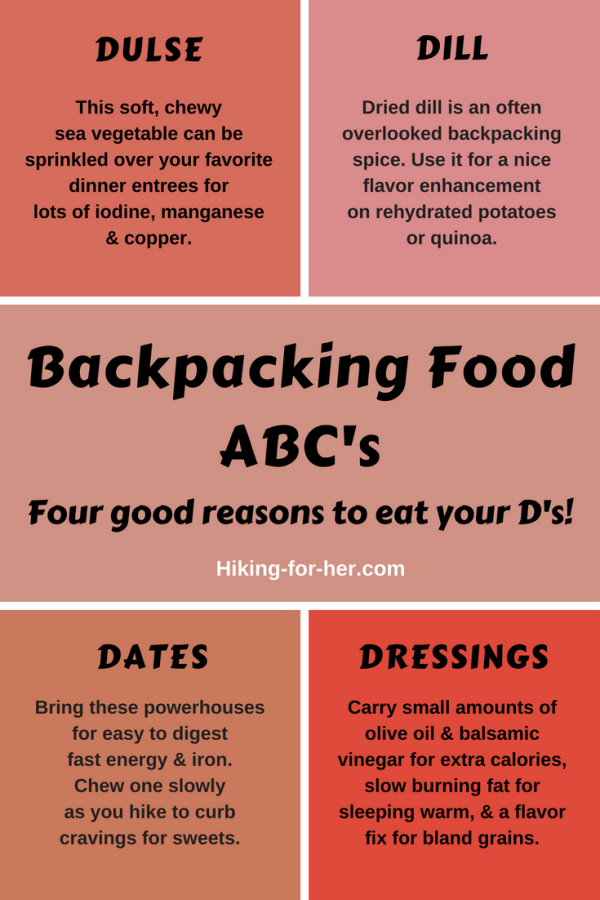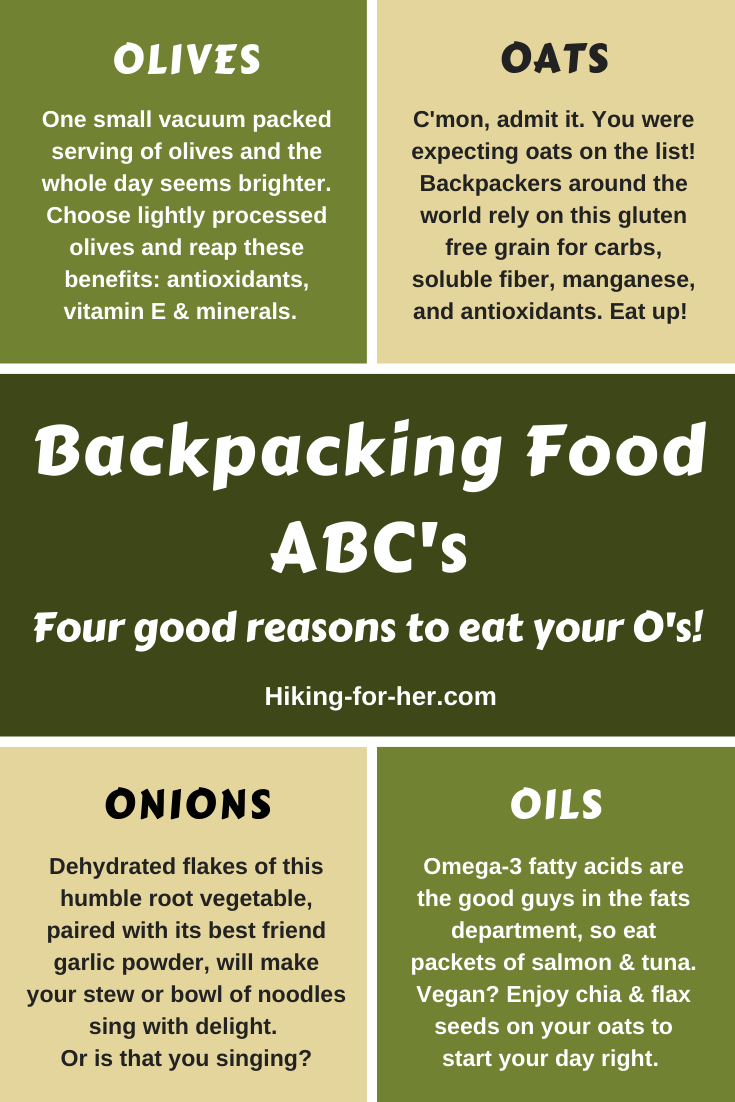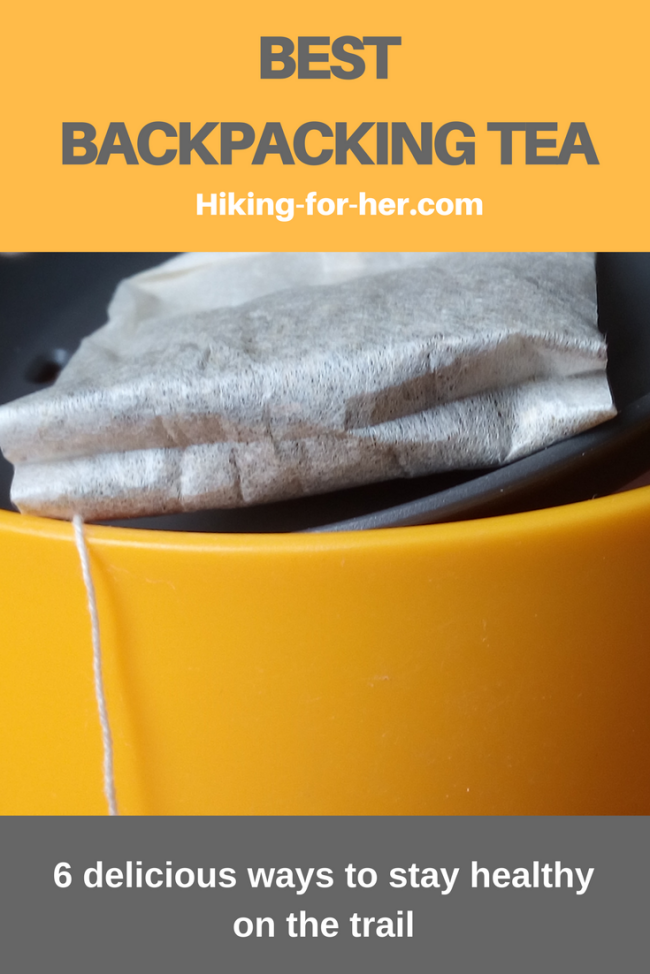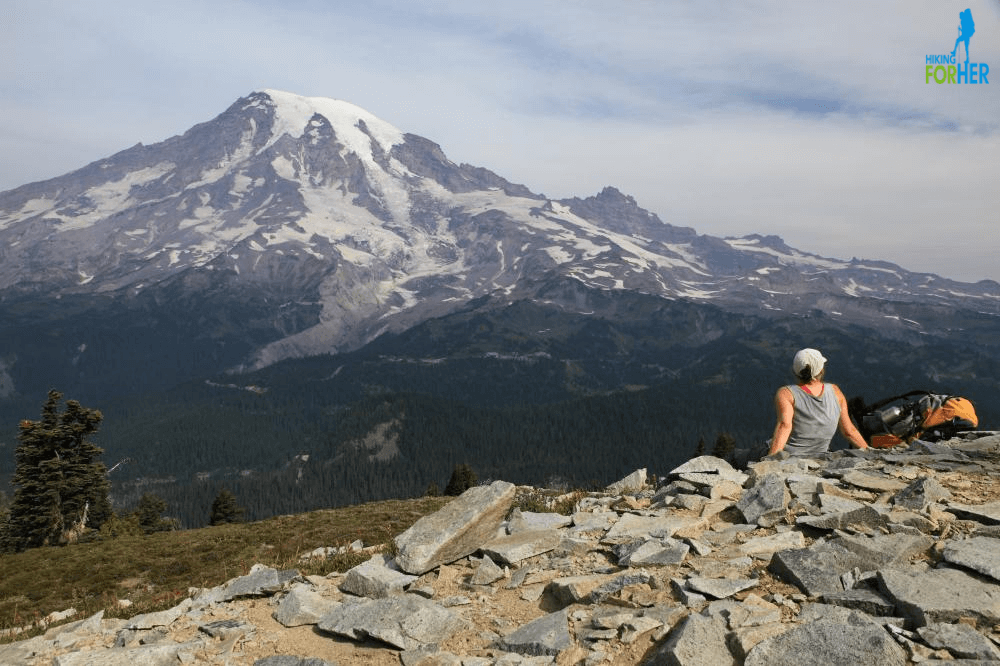
Backpacking Food Ideas For
Breakfast, Lunch, Dinner
And Snacks!
By Diane Spicer
Ready for some great backpacking food ideas? Excellent!
But before you discover the food to take backpacking, just a word of warning: a lot goes into the best backpacking food.
Who cares? I'm hungry. Skip to the good stuff:
Top 4 factors in choosing
great backpacking food
As you plan your backpacking meals, you are faced with trade-offs among the top 4 factors in the best backpacking food ideas:
- weight (freeze dried, dehydrated, or fresh)
- flavor (salty, sweet, spicy or bland)
- cost (cheap versus pricey)
- nutrition (calories and nutrients)
You also need to know how to calculate exactly how much food (calories and nutrients) you'll need.
And why hiking nutrition is so very important to your success as a backpacker.
The backpacking food ideas you're about to explore were picked with all of these factors in mind.
So let's go through a typical day of hiking food you would consume on a backpacking trip.
Note: Hiking For Her is an Amazon affiliate. When you purchase your backpacking food here, HFH receives a small percentage of your purchase price.
You pay nothing extra for these great backpacking food ideas. The goal is to help you with the question of which food to bring backpacking!
Backpacking food ideas:
breakfast
When I shed my sleeping bag in the morning, I'm in a "let's get on the trail" frame of mind, so speed is of the essence.
Boiling water added to instant oatmeal, plus a mug of antioxidant loaded green tea, provide fast satisfaction
I also throw a handful of unsalted dried fruit & nuts into the oatmeal, which ups the nutritional value and keeps my taste buds from grumbling about bland old oatmeal.
Note that this combination balances the three major fuel sources a backpacker needs: carbohydrates, fats, and proteins.
My favorite instant oatmeal: McCanns Irish oatmeal, maple and brown sugar variety.
- You can drip a bit of oil (EVOO) into it to up the fuel quotient in cooler weather.
Backpacking oatmeal tip:
You can allow your oats to soak overnight in a water bottle or covered pot, eliminating the time and energy to fire up the stove to rehydrate them.
This route to a hearty backpacking breakfast isn't recommended in cold spring or fall weather, because it robs your body and mind of the welcoming warmth of piping hot oatmeal.
Cheap backpacking food
My cheapest backpacking breakfast?
- Instant oatmeal from the bulk bin at my local food store.
It doesn't come near to the creamy goodness of McCanns, but sometimes that's all that's available on short notice or when I'm traveling for a backpacking trip.
Here's a standard backpacking food tip:
Go to your nearest grocery store or outlet and spend fifteen minutes making a list of the bulk foods you can use for cheap backpacking meals.
Then sit down and plan your creative backpacking menu, knowing that you're going as low cost as possible.
Caveat:
Although this is the cheapest meal preparation for a backpacking trip, it may not be the best backpacking food if you're searching for healthy choices (preservative free or lower salt) or high quality specialty (gluten free, paleo) sources of hiking nutrition.
Add some nutritional oomph
to those oats!
Bonus points for adding a tablespoon of chopped walnuts, ground flax seeds, or chia seeds!
- Sometimes the little details in backpacking food ideas make a huge difference in taste and nutrition.
If you're going to add flax, go for the golden flakes!
Gluten free and high in fiber, but remember to drink extra water to take advantage of the scraping action inside your digestive system.
(was that TMI?)
Chia seeds are amazing powerhouses of nutrients, and weigh almost nothing.
I highly recommend these as an addition to your micronutrient supply.
 |
Tip: Chew slowly to grind down these seeds so the nutrients are released and can help you on the trail. |
Another way to get a great backpacking breakfast into your body fast is to add a few spoonfuls of an antioxidant mix to your oats.
It's lightweight and you'll love how it improves the flavor profile of good old oatmeal.
 |
Barlean's antioxidant blend mixes flax, coconut, acerola, acai and camu camu for high fiber and lots of omega-3 and vitamins. |
Other grains to try
for a backpacking breakfast
Oatmeal is a tried and true trail food for backpackers.
But let's be more creative, given the constraints of dawn's early light.
- First thing in the morning, you want to eat and hit the trail.
So which grains can be rehydrated quickly, and taste good?
Here are my two favorite grains for a simple backpacking breakfast:
Quinoa tip:
This ancient gluten free grain is available in two more colors:
Or why not try a quinoa blend, like this tricolor mix?
Second oatmeal alternative to try for a hearty backpacking breakfast: amaranth
 |
Lots of protein! Takes longer than oatmeal and quinoa to rehydrate. Texture may be a bit gloppy compared to those grains, but you can flavor hack it and then gobble it up. |
Backpacking food ideas:
lunch
When it's time to find a great sit-spot around mid-day, I'm famished.
But backpacking lunches need to be consumed quickly and with a minimum of preparation.
So I pull out the sandwich I made that morning, and munch away while enjoying the view.
Backpacking bread alternatives
for lunch
When there is no bread available, it's time to break out tasty crackers and nut butters.
Repackage these crackers so you're not having to find space for the boxes.
But be sure to guard the crackers from inadvertent "smush" events (like sitting on your backpack).
 |
Crackers packed like this is a good way to keep them from crumbling, although the extra packaging takes up space (but no weight) in your backpack. |
 |
Another approach is to use crackers like a spoon to transfer your nut butter into your mouth. Choose sturdy ones, like these! |
 |
And if you're going to be relying on some that pack a big nutritional punch, you want something like these seed studded crackers. |
Try a fishy backpacking lunch
I've also unearthed lightweight tins of easy-open protein rich sardines or herring in nutrient dense olive oil from the bowels of my backpack to supplement my crackers.
In fact, paired with crackers, these little salty fishes are quite tasty and highly satisfying due to the oil!
Be sure you have a spork to capture every last drop.
- Just be careful to keep any fishy oil away from your clothing or pack in bear country.

And about that spork... I tend to lose them, so I buy a 4-pack at the beginning of every hiking season.
I follow these carbs + protein lunch choices with some tasty cookies (think nut butters or nuts plus oatmeal), a chunk of dark chocolate with almonds, or a Hiking For Her energy sphere (free pdf).
Want more calories or a heavier lunch?
I realize that some hikers prefer chunks of cheese/salami with crackers.
Jerky + big handfuls of trail mix (nuts, dried fruit, chocolate) and granola bars are also classic backpacking food ideas for lunch.
Here's an excellent type of jerky to try: EPIC Bison Bacon Cranberry Bars.
For a ready to go trail mix blend that is delicious, try this one: berries and nuts. Yum!
|
Buy two packages, because you're going to snarf those down in a hurry. Unless you're smart enough to bag up just enough for each day, and be disciplined with yourself. |
 |
I've also backpacked with people who munch only nuts or dried fruit for lunch, and they seem to do just fine.
But that's a bit too light for me!
Moral of the story:
Play around with your food on day hikes to see which type of backpacking lunches, day after day, will work best for your digestion.
And be prepared to change things up as you age.
- More tips for healthy older hiking here
Now for some
backpacking food ideas for dinner
Ah! First the boots come off, then the stove gets cranked up to boil water.
This hot water is used to rehydrate some soup as a backpacking appetizer, which I sip slowly as more water boils.
- Boiling water is also one strategy for backpacking water purification.
- Your stove can accomplish double duty while you are setting up camp for the night.
Best backpacking dinner entrees
After much experimentation, I mostly use the Backpacker's Pantry line of prepared backpacking meals.
Why?
Because they are lean on artificial additives but high on flavor and nutrients (some even have vitamins and minerals added).
Go to this company for great backpacking food ideas - lots of breakfast and dinner entrees, vegetables, and desserts for you to scope out.
I think they're a reliable backpacking food option at the end of a long trail day.
Are they the cheapest freeze dried food on the market?
No, but they're a top brand for healthy and satisfying backpacking food.
Check out how to save with bulk purchases from REI Co-op here.
Another viable option
for backpacking food ideas
I started backpacking way back in the 1970s, when Mountain House freeze dried food was just about the only option for a hungry hiker.
Recently, I revisited their product line and was pleasantly surprised by its taste and variety.
- Read my Mountain House review here.
If you're looking for cheap and filling backpacking meals which you can buy in bulk, Mountain House should be at the top of your list.
Don't skip your antioxidants
Antioxidants can be hard to come by after a few days on the trail.
Usually you get these plant-derived protective molecules (a.k.a. "phytonutrients") in salads, cranberries, apples, red wine.
Tip:
On the trail, turn to peanuts and dark chocolate as backpacking snacks to keep your cells protected from damaging free radicals (highly energetic little guys, looking to cause trouble on a molecular level).
- More antioxidant ideas for backpackers here
Try something a little wacky!
Dare to deviate outside the bounds of accepted backpacking food ideas. For example:
Or this:
Lots more backpacking food ideas of the ABC variety to spice up your life here!
Rice is always nice
Rice has been a tried and true foundation for many a tasty backpacking meal, for good reasons: lightweight, easy to cook, filling.
But a smart hiker chooses the right type of rice, which is explained in detail here.
How much protein
does a backpacker need?
Protein is used to repair and rebuild your muscles, and that's important for your stamina and strength.
Carrying fresh protein can be heavy, if you focus on animal protein sources.
However, dried beans and nuts, along with other lightweight dehydrated and freeze dried animal proteins, can be worked into your backpacking menus with ease.
Not sure which protein sources for hikers are best for you?
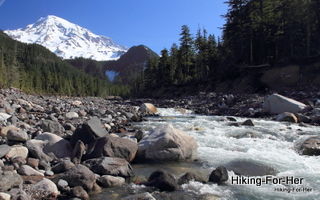 You'll need to be strong to cross streams on the trail, and protein helps you stay strong
You'll need to be strong to cross streams on the trail, and protein helps you stay strong
Backpacking food ideas:
Organic freeze dried options
If you are concerned about pesticide residue in your backpacking meals, turn to organic food options for healthy backpacking.
Surprise!
I happen to have some information on organic backpacking food to help you size up your options.
A note about a hearty dinner
You want to eat enough food to keep up your core temperature throughout the night and to replace the water you sweated/peed out during the day.
Don't skimp on calories when you're backpacking. Consider it richly deserved fuel!
You might have to erase or block all of the marketing messages about thinness while you're on the trail. Eat up!
While you are in "rest and digest" mode, dominated by the parasympathetic nervous system, the nutrients from dinner are being used to rebuild glycogen reserves for the next day's hike.
Also, your body is repairing damage to muscles, tendons, and bones from lugging your pack up the trail. No inflammation for you!
As an additional benefit, you won't wake up at 2AM with hunger pangs if you take the time to prepare and ingest a hot dinner.
And cold nights won't bother you, because your internal furnace is well stoked.
- More tips for satisfying backpacking meals to keep you full here
Turn to seaweed
for much needed nutrients
Sea vegetables are packed with important salts and trace minerals that your body needs after a long day on the trail.
In North America, they might seem like an odd inclusion in backpacking food ideas.
But there are plenty of delicious ways to enjoy seaweed snacks on your hiking trip, including my favorites.
Include a tea time ritual
in your backpacking food ideas
One more inexpensive thing you can do to keep yourself healthy on the trail: brew up a cup of tea right before bedtime.
You've already met peppermint tea as a solution to gassy abdominal distention (see infographic above).
Click on the photo below to discover six reasons why backpacking mugs of tea should be on your menu.
- And enjoy recommendations for the best backpacking teas
Backpacking food ideas:
dessert and sweet treats
After you sip your soup, munch your dinner, and relax with a mug of tea, it's time for that final delicious treat of the day: your favorite backpacking desserts.
A fast way to get something sweet into your mouth is to make your backpacking snacks do double duty (suggestions below).
|
However, with a little planning and some extra water, you can enjoy something more substantial and filling. And tasty. Don't skip tasty! |
 |
Another satisfying way to conclude your day is to slowly chew some dried fruit that you don't normally enjoy at home.
For me, that's dried cherries, either unsweetened or covered in dark chocolate with their friends, blueberries.
Pull these out of the food sack and watch your trail buddy's eyes light up!
Want more details on why I go with dark chocolate? Read this.
Final tip on backpacking dinner meals
Here's the best advice on backpacking food ideas that I can give you:
Try your backpacking meals at home before you hit the trail.
Don't risk bringing food that you don't like and can't make yourself choke down, because you're risking your strength and stamina.
- Trust me (an old trail dog) on how fast you begin to feel depleted when you skip meals.
- And that erodes your safety margins when you can't make clear headed decisions about navigation or trail hazards.
Best backpacking food ideas
for trail snacks
When you're burning daylight making some mileage and don't want to stop to eat, what types of backpacking foods can you eat as you hike?
You want something that's not too dry to choke down, and of course you want to avoid choking hazards.
Nutrient density should be high, along with fast digestibility.
And then there's taste. You want a delicious backpacking snack!
Here are two of my favorite trail snacks that ride along easily in your backpack's shoulder strap zippered pocket, or a pants pocket.
Did you know that
your mindset is important?
How you think about backpacking food needs to change when you're on the trail day after day.
I go into a multi-day backpacking trip realizing that I will come out the other end with intense cravings for fresh salads, juicy bowls of fruit, and hot home cooked meals.
I chalk up those cravings as the price of admission to the back country, a price I am more than willing to pay every time I go on a hiking trip.
- Plus, it feels so good to finally eat whatever I'm craving! In a perverse way, I almost look forward to the deprivation.
Here's the compromise I've reached with myself on choosing the best backpacking food:
I carry dehydrated and freeze dried foods mentioned above for breakfast and dinner with plentiful portions, and take time to prepare them.
Then I make up time with lunches built around tasty, uncrushable trail foods high in carbohydrates with protein and fat playing supportive roles.
In addition, I pack a multivitamin and other nutritional supplements, "just in case".
So just know that predicting ahead of time what your mind and body might be screaming for after a few days on the trail is a wise move!
- Factor your mind set into your choice of backpacking food ideas, because planning your backpacking menu based on your favorite flavors
mightwill save your sanity.
Weight is a huge issue for any backpacker.
The weight of your food, clothing, water, tent, sleep system.
To minimize weight and get the most energy out of each mouthful of backpacking food, read my tips for high calorie backpacking food.
Summing up these backpacking food ideas
Bottom line for the best backpacking food ideas for your next trip?
- Fall back on the mantra of the 3 major classes of fuel biomolecules: carbohydrates, proteins, fats.
- Then build a creative backpacking meal plan around the choices I shared with you.
Here's an idea to try on your first (or next) backpacking trip to gauge how you are doing, nutrient wise: keep a daily food log in your trail journal.
Note which backpacking meals or hiking foods were especially satisfying, which brands or flavors you loved, and any weird cravings you had.
- This takes only a few seconds, but yields valuable insight when you look back over it months later as you prepare for another trip.
If you're prone to drama, you can also doodle the names of the things you hated, and embellish them with exclamation marks (or worse), just for fun.
If you want feedback from body parts beyond your taste buds, be sure to compare pre-trip body weight with post-trip weight, plus keep track of your daily energy levels.
This info builds a complete picture of how your "fuel burning plan" (a.k.a. "backpacking food list") worked out.
Tweak until perfect!
Wow! What a great way to justify lots of backpacking adventures!
Just gotta cook on the trail?
If you like to be a creative backpacker and devote precious outdoor time to cooking & cleaning up (see my bias?), there are tons of great recipes for backpacking meals, from talented outdoor chefs.
Whipping up backpacking meals is an art, and Chef Glenn is a master of tasty trail food and fancy flourishes.
Not sure about playing the role of
backpacking chef?
Here's an entertaining way to decide whether you're a minimalist or a gourmet back country chef:
I have embraced the reality that I'm probably in the minority: a cooking minimalist.
I humbly accept my outcast status, because to me, the entire point of going into the back country IS to explore the back country!
But a hiker's gotta eat, right?
One last backpacking tip
I always trust the wisdom of my body when I get home from a backpacking trip, especially if I'm a few pounds lighter.
If I crave pickles on toast with a side of bacon, that's what I eat until the craving disappears!
It's just my little "thank you" to the muscles and bones which got me up and down the trails, and back home safely.
So you have my permission to honor your cravings.
They might be little postcards from your digestive system to your brain, saying "Pick up a jar of pickles and three pounds of bacon on your way home, honey."
But don't go yet!
Lots more hiking food selection tips here!
And if you're a bit puzzled over the difference between dehydrated backpacking food ideas and freeze dried backpacking meals, read this.
Best wishes for staying well fed on the trail :)
Home page > Best Backpacking Tips
Best Backpacking Food Ideas
|
I get emails all the time about what I wear, eat, carry and love to use on the trail. That's
why I provide affiliate links to you: the best gear that I use myself and have seen used by other hikers is instantly
available for your consideration, and the gear company sends a few
pennies per dollar to this reader-supported hiking website. There is no added cost to you! Everyone ends up a winner: Great gear for you, strong gear companies, and more free hiking tips for everyone. Thanks very much for your support. It's warmly and sincerely appreciated. It also helps send these hiking tips to all your virtual trail buddies around the globe. |
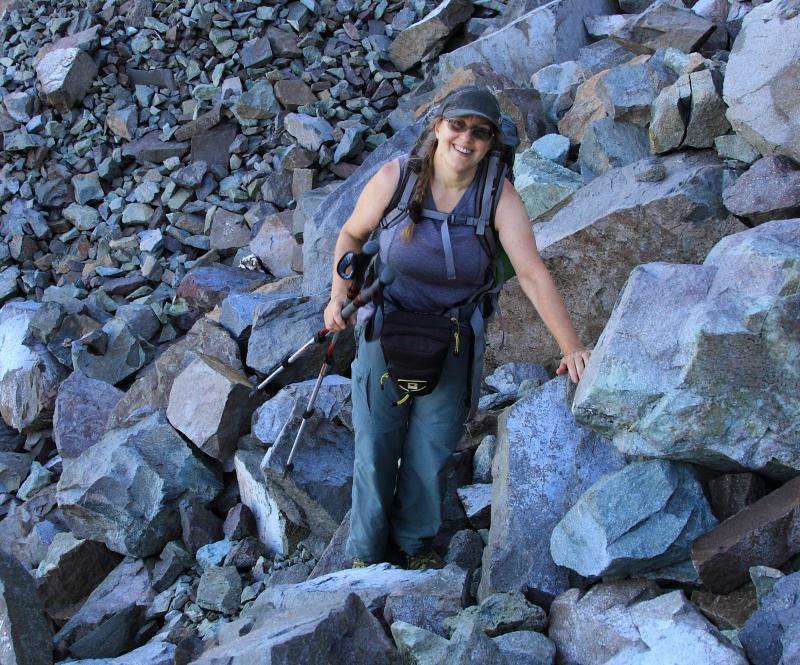 |
